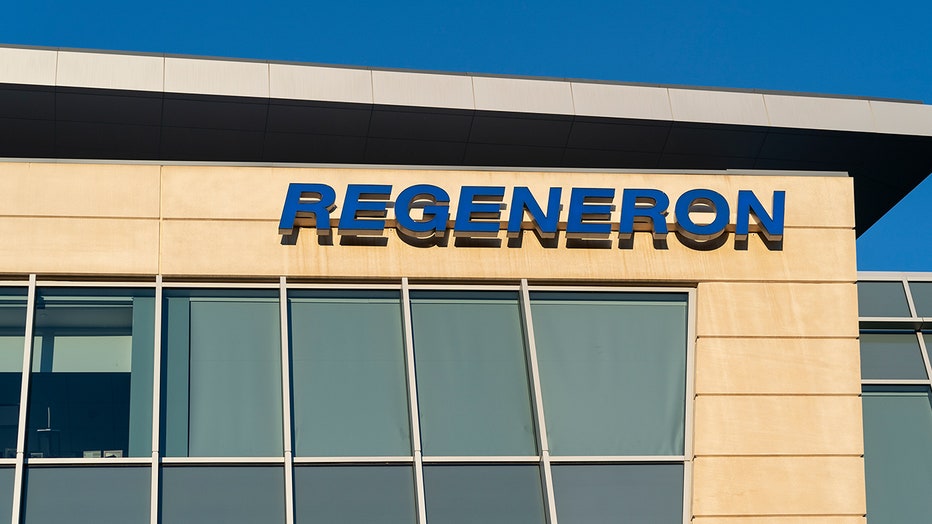Regeneron’s COVID-19 drug authorized by FDA for injection
WASHINGTON - The U.S. Food and Drug Administration has cleared a formulation of the COVID-19 antibody drug made by Regeneron Pharmaceuticals Inc. that can be injected, rather than administered by IV infusion, the company announced Friday.
Regeneron’s monoclonal antibody drug, called REGEN-COV, has been available since last November under emergency-use authorization to treat mild-to-moderate COVID-19 patients.
Now, the new authorization could make it even easier for patients to get the treatment, as it offers another form of protection against the coronavirus for those who have not received a vaccination.
The agency has lowered its dose to 1,200 mg and allowed the administration of casirivimab and imdevimab by injecting it under the skin when intravenous infusion is not possible and would lead to treatment delay.

View of Corporate and Research and Development Headquarters of Regeneron Pharmaceuticals, Inc. on Old Saw Mill River Road.
"Despite increased use of vaccines, thousands of patients are still becoming infected in the U.S. every day, with many at high risk of serious complications from COVID-19. Unfortunately, to date only a fraction of patients eligible for antibody treatments have received them, which we hope will change based on this updated FDA authorization," said Dr. George D. Yancopoulos, president and chief scientific officer at Regeneron.
"REGEN-COV has also demonstrated potency against the main variants of concern to date in vitro and is the only antibody therapy currently available across the U.S., including in states where variants first identified in Brazil and South Africa are circulating at a higher rate," Yancopoulos continued.
The updated FDA authorization is based on data from several trials, including a recently presented Phase 3 trial which showed REGEN-COV reduced the risk of hospitalization or death by 70% in high-risk non-hospitalized patients, and that the treatment effect was consistent between the 1,200 mg and 2,400 mg doses.
In April, the company shared clinical trial results, which found that its REGEN-COV treatment reduced the overall risk of developing symptomatic COVID-19 by 81%, compared to those who received a placebo.
The COVID-19 antibody cocktail also offered strong protection against symptomatic infection when given to people living with someone else infected with the virus.
RELATED: Regeneron asks FDA for emergency use authorization for antibody drug that treated Trump
Regeneron’s clinical trial enrolled more than 1,500 people who lived in the same household as an individual who tested positive for the virus within the prior four days. They were randomly assigned to receive either one dose of REGEN-COV or a placebo.
After about a month, 1.5% of volunteers who received the treatment had symptomatic COVID-19, compared with 7.8% of those who received a placebo. Regeneron said the treatment offered 72% protection against symptomatic cases within the first week and 81% protection by day 29.
RELATED: Regeneron’s COVID-19 antibody drug prevents symptomatic infection by 81%, study finds
The trial also showed that REGEN-COV, which is a combination of monoclonal antibodies casirivimab and imdevimab, shortened COVID-19 symptom duration and reduced viral levels, the company said in a statement.
Overall, more than 9,000 people have received IV REGEN-COV in clinical trials in both hospitalized and non-hospitalized settings, the company said.
To date, 63% of the U.S. population has received at least one dose of a COVID-19 vaccine and 52% are fully vaccinated against the virus, according to the Centers for Disease Control and Prevention. While current vaccines have become more available and have been shown to be both safe and effective, antibody drugs could help those who haven’t been inoculated for various reasons.
Antibodies are a crucial part of the body’s adaptive immune system that bind to and help eliminate a virus, but it takes several weeks after infection or vaccination for the most effective ones to form. Drugs like REGEN-COV are intended to help sooner by supplying concentrated doses of one or two antibodies that work best.
The drug was given as an experimental medicine to former President Donald Trump when he was sickened with the virus in October, prior to the FDA’s emergency use authorization.
In a video, Trump called the drug "a cure" after receiving it during his three-day stay at Walter Reed National Military Medical Center, though the medical community maintains COVID-19 has no known cure.
Several drugs are already recommended to treat people hospitalized with COVID-19, according to the NIH. These include the antiviral drug remdesivir.

